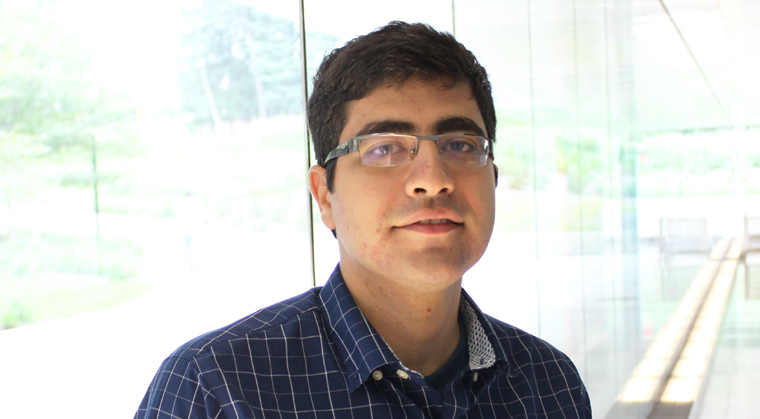The economics of energy – Hamidreza Tavafoghi earns a Dow Sustainability Fellowship
Hamid is studying ways to increase the use of renewable energy sources on the grid.

 Enlarge
Enlarge
Hamidreza Tavafoghi, a doctoral student in electrical and computer engineering, has been awarded a Dow Sustainability Fellowship to support his research in energy economics.
Hamid is studying ways to increase the use of renewable energy sources on the grid. The power industry is among the nation’s largest markets – last year, it produced about $370.5 billion in revenue. Adapting the nation’s grid to include renewable power, energy storage, and other technologies essential for sustainable energy sources requires a shift in how this enormous market operates to ensure an efficient and stable transition.
The grid currently handles predictable power and unpredictable power separately. There’s a market for scheduled energy use, and a separate market to accommodate intermittent supply. Renewable power sources such as solar and wind energy are often unreliable, so incorporating them into the scheduled market poses many challenges.
Hamid is investigating several potential market solutions to deal with these challenges, such as integrating energy storage, and creating sequential contracts that allow for dynamic and flexible energy delivery. Energy storage would help compensating the volatility and the intermittency in power supply when conditions aren’t ideal. Dynamic contracts allow sellers to adjust their energy schedule as they learn more about their supply capabilities and the demand of the buyers.
There are many forces at play when it comes to energy markets.This project requires a multidisciplinary point of view, integrating solutions and ideas from the fields of electrical engineering, economics, public policy, business, big data analysis, and civil and environmental engineering.
Hamid is advised by Prof. Demosthenis Teneketzis, who has worked with electricity markets. “It becomes a more interesting and challenging problem when you add renewables,” Hamid says. “Each new element, like storage, creates new challenges and new problems.”
Hamid has an affinity for problems that lay at the crossroads of different fields. In addition to his Ph.D. in Electrical Engineering:Systems, he is pursuing a Master’s in Economics. As part of the Dow Sustainability cohort, he’ll have the opportunity to discuss his research with faculty and students from disciplines across U-M.
Hamid’s previous honors include a Rackham Graduate Fellowship Award and a poster award at the U-M Engineering Graduate Symposium. He plans to stay in academia once his studies are through, and has already gained experience as a teaching assistant for both undergraduate and graduate level courses.
About the Fellowship
The University-wide Dow program supports full-time graduate students and postdoctoral scholars who find interdisciplinary, actionable, and meaningful sustainability solutions. Fellows are awarded $50,000 for their studies, participate in monthly workshops and cohort-building activities to enhance their sustainability knowledge, and complete an interdisciplinary team project.
 MENU
MENU 
